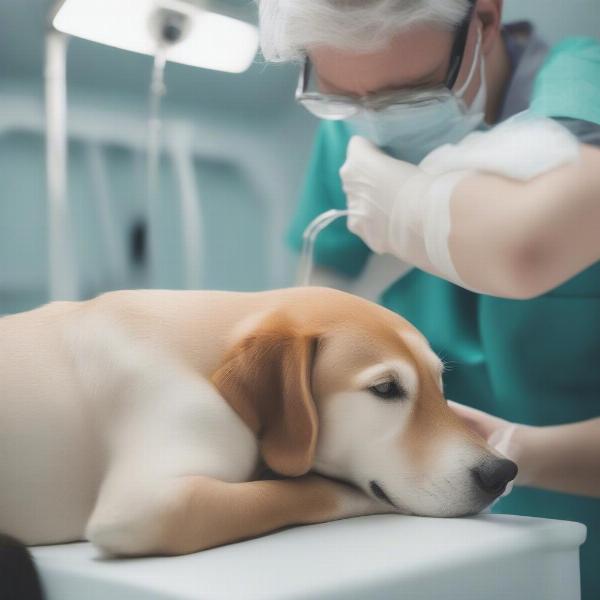High neutrophils in dogs, also known as neutrophilia, can be a sign of various underlying health conditions. Understanding what neutrophils are, why their levels might be elevated, and what it means for your canine companion is crucial for ensuring their well-being. This article will delve into the causes, symptoms, diagnosis, and treatment of high neutrophils in dogs, providing you with the information you need to navigate this potential health concern.
What are Neutrophils and What Does a High Count Mean?
Neutrophils are a type of white blood cell that plays a vital role in a dog’s immune system. They are the first line of defense against bacterial infections, rushing to the site of injury or infection to destroy harmful bacteria. A high neutrophil count, or neutrophilia, often indicates that the body is fighting an infection. However, it can also be a sign of other conditions like stress, inflammation, or certain types of cancer. Therefore, understanding the context of high neutrophils in dogs requires a comprehensive veterinary evaluation.
Causes of High Neutrophils in Dogs
Numerous factors can contribute to high neutrophils in dogs. Identifying the underlying cause is essential for effective treatment. Some common reasons for elevated neutrophil counts include:
- Bacterial Infections: This is the most common cause of neutrophilia. Infections can range from minor skin wounds to serious systemic illnesses.
- Inflammation: Conditions like pancreatitis, arthritis, and inflammatory bowel disease can lead to increased neutrophil production.
- Stress: Physical or emotional stress, such as a recent surgery or a move to a new home, can temporarily elevate neutrophil levels.
- Certain Medications: Steroids, in particular, are known to increase neutrophil counts.
- Cancer: Some types of cancer, particularly leukemia, can cause an overproduction of neutrophils.
- Immune-mediated Diseases: These diseases, where the immune system attacks the body’s own tissues, can also trigger an increase in neutrophils.
Symptoms Associated with High Neutrophils in Dogs
The symptoms accompanying high neutrophils in dogs vary widely depending on the underlying cause. Some dogs may show no outward signs, while others may exhibit a range of symptoms, including:
- Lethargy and Weakness: The dog may appear tired and less active than usual.
- Loss of Appetite: A decreased interest in food can be a sign of underlying illness.
- Fever: An elevated body temperature indicates the body’s fight against infection.
- Vomiting and Diarrhea: These can be signs of gastrointestinal issues or systemic infections.
- Pain or Discomfort: The dog may whimper, whine, or show signs of discomfort.
Diagnosing High Neutrophils in Dogs
A complete blood count (CBC) is the primary diagnostic tool used to identify high neutrophils in dogs. Your veterinarian will likely recommend further testing, such as:
- Biochemistry Profile: This test assesses organ function and can help identify underlying diseases.
- Urinalysis: Examining the urine can provide clues about kidney function and infections.
- Imaging Tests (X-rays, Ultrasound): These tests can help visualize internal organs and detect abnormalities.
- Biopsy: In some cases, a tissue sample may be taken for further analysis.
 Veterinarian Performing a Physical Exam on a Dog
Veterinarian Performing a Physical Exam on a Dog
Treatment for High Neutrophils in Dogs
Treating high neutrophils in dogs focuses on addressing the underlying cause. This could involve:
- Antibiotics for bacterial infections
- Anti-inflammatory medications for inflammation
- Surgery for certain conditions
- Chemotherapy for cancer
- Supportive care to manage symptoms
Conclusion
High neutrophils in dogs can be a sign of various underlying health conditions. It is crucial to consult with your veterinarian for a proper diagnosis and tailored treatment plan. Early detection and intervention are key to ensuring your dog’s health and well-being. Don’t hesitate to contact your veterinarian if you notice any unusual symptoms or changes in your dog’s behavior.
FAQ
- What is the normal neutrophil range for dogs? A normal range can vary slightly between laboratories, but generally falls within a specific range. Your veterinarian will interpret your dog’s results.
- Can stress alone cause significantly high neutrophils in dogs? While stress can elevate neutrophils, significant elevations are usually indicative of a more serious underlying issue.
- Are high neutrophils always a sign of something serious? Not necessarily. Mild elevations can be temporary and resolve on their own. However, persistent or significant elevations warrant further investigation.
- How long does it take for neutrophil levels to return to normal after treatment? This depends on the underlying cause and the effectiveness of the treatment.
- What can I do to support my dog during treatment for high neutrophils? Provide a comfortable and stress-free environment, ensure they are eating and drinking adequately, and administer medications as prescribed by your veterinarian.
- Are there any natural remedies for high neutrophils in dogs? While some natural remedies may support overall immune health, it’s crucial to consult with your veterinarian before using any alternative treatments.
- Can high neutrophils in dogs be contagious to humans? The underlying cause of high neutrophils might be contagious (like some bacterial infections), but high neutrophil count itself is not.
ILM Dog is your trusted resource for expert advice on all aspects of dog care, from breed selection to health, training, and nutrition. We offer a wealth of information to help you provide the best possible care for your furry friend. For professional guidance tailored to your dog’s specific needs, contact us at [email protected] or call us at +44 20-3965-8624. ILM Dog provides comprehensive resources for dog owners, covering everything from health and wellness to breed information and product recommendations.